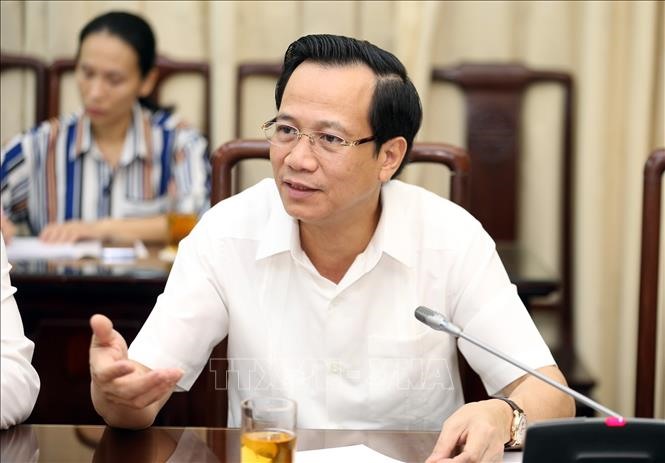.jfif) Opinion
Opinion

Minister of Labour, War Invalids and Social Affair Đào Ngọc Dung speaks to the newspaper Thời báo Kinh tế Việt Nam (Việt Nam Economics Time) about new changes in occupational education this year
 |
| Minister of Labour, War Invalids and Social Affairs Đào Ngọc Dung |
Minister of Labour, War Invalids and Social Affairs Đào Ngọc Dung speaks to the newspaper Thời báo Kinh tế Việt Nam (Việt Nam Economics Time) about new changes in occupational education this year
2018 was deemed a breakthrough year for occupational education. What were the major achievements?
Occupational education is a very important issue for the national development of any country. With such an important mission assigned to the Ministry of Labour, War Invalids and Social Affairs (MOLISA), we worked hard to reach our goals.
In the past two years, we issued a total of 46 documents, including five decrees, seven decisions of the Prime Minister, 30 circulars, plus four Inter-ministerial circulars. Also in the last two years we streamlined occupational training institutions. As a result, 329 occupational training centres at district level and 36 secondary occupational institutions were closed down. We tried hard to make the courses tailored to the market/enterprises needs.
All in all, in 2018, we had 2.2 million people registered to attend training. What’s more important is that many people decided to learn an occupation rather than to go to universities or other academic institutions.
What has MOLISA done to meet the labour requirements in the Industry 4.0?
This is one of our important tasks for 2019.
First, we will review all existing occupational training schools/institutions nationwide and come up with plans to improve training activities as written in the Government Decree No 08 which was issued on January 24, 2018. Under the Decree 08, by 2021, at least 10 per cent of the public occupational training institutions will be slashed. And by 2025, another 10 per cent of the remaining public occupational training institutions will be slashed.
Second, all occupational training schools/institutions have adopted measures to link theory learning with practical learning in enterprises’ workshops. This is a very important issue to link occupational training and the labour market as well as the social security for the country as a whole.
Third, all occupational training institutions, private or public, have to upgrade their teaching content to help students keep up with science and technology.
Fourth, all the occupational training institutions must uphold to their commitment to high quality teaching and learning in the national course of renewal.
And finally, all training institutions must uphold the principles of autonomy and accountability in their operation.
At present, the MOLISA has developed a pilot programme on training and re-training the workers to help them adapt to the fourth industrial revolution. In the meantime, MOLISA is writing a proposal on mechanism and policy to encourage all occupational training institutions to be proactive in joining the Industry 4.0.
Has MOLISA adopted any policies to attract enterprises to take part in occupational training?
This is a very practical and good idea. We have considered getting enterprises involved in occupational training activities as one of the three breakthroughs in the proposal “Make a change and improve the quality in occupational training”. We have already adopted a comprehensive plan to ask enterprises to join in activities on occupational training which are organised both at the central and local levels, including activities organised by the occupational training schools themselves.
Meanwhile, we have also revised the Government Decree No 48 and other related legal documents to encourage enterprises to give lessons to students attending occupational training schools. The teaching hours could be up to 40 per cent of lecturing or practicing hours.
Recently, 10 Vietnamese occupational training centres/schools signed memorandums of understanding with 15 foreign groups or enterprises to send Vietnamese skilled workers to go to their countries.
To create a two way communication between occupational training schools with enterprises, the MOLISA will develop labour market information to meet demand. — VNS




